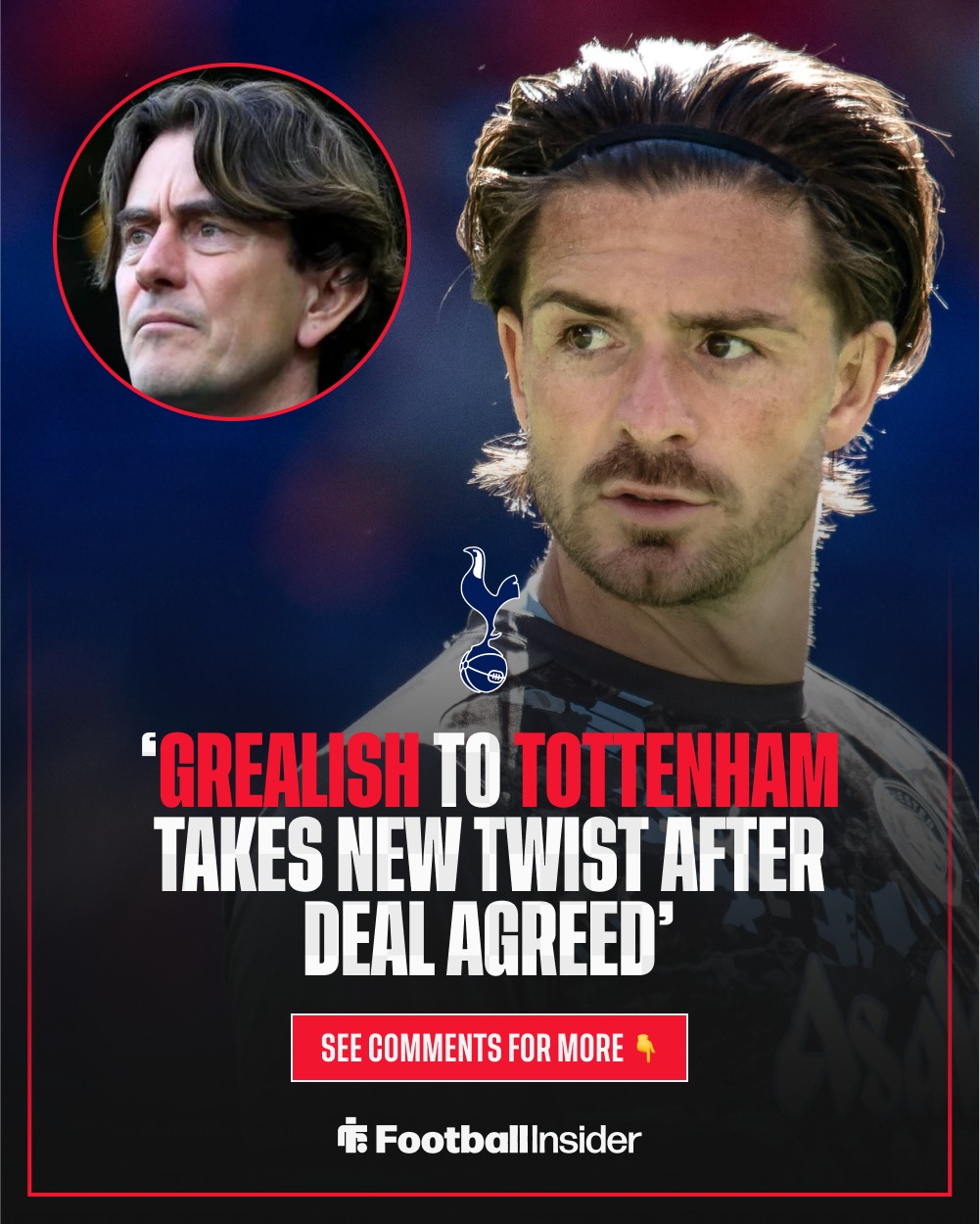Jack Grealish to Tottenham takes new twist after deal agreed

The summer transfer window of 2025 has proven to be one of the most intriguing and strategically complex periods in recent Premier League history. As clubs navigate the delicate balance between financial sustainability and competitive ambition, several high-profile transfer sagas have emerged that not only captivate fans but also provide fascinating insights into the modern football landscape. From Jack Grealish’s uncertain future at Manchester City to the ripple effects of player movements across London clubs, this summer’s transfer activity reveals the intricate web of relationships, financial considerations, and tactical planning that define contemporary football.
The Jack Grealish Conundrum: A Tale of Unfulfilled Potential
At the heart of this summer’s transfer speculation lies the complex situation surrounding Jack Grealish and his potential departure from Manchester City. The English winger, who commanded a British record transfer fee of £100 million when he moved from Aston Villa to the Etihad Stadium, now finds himself at a crossroads that exemplifies the harsh realities of elite football. Despite his undeniable talent and previous achievements, Grealish managed just 715 minutes of Premier League action last season, a statistic that starkly illustrates how even the most expensive signings can struggle to secure their place in Pep Guardiola’s meticulously crafted system.
The Grealish situation represents more than just a simple case of a player seeking more game time. It highlights the evolving nature of modern football, where tactical flexibility and system compatibility often outweigh individual brilliance. Guardiola’s Manchester City operates as a well-oiled machine, with each component required to fulfill specific roles within a broader tactical framework. While Grealish possesses exceptional technical ability and creativity, his natural playing style doesn’t always align perfectly with the disciplined positional play that City demands from their wide players.
This misalignment has created a scenario where one of England’s most talented players finds himself surplus to requirements at his current club, despite his obvious quality. The situation serves as a reminder that football success isn’t solely determined by individual talent but by how effectively players can integrate into their team’s tactical approach and philosophy.
Tottenham’s Strategic Rebuild Under Thomas Frank
The most significant development in Grealish’s potential transfer story centers around Tottenham Hotspur’s interest and their subsequent strategic decisions. Under the guidance of Thomas Frank, Spurs have embarked on an ambitious rebuild following their disappointing 17th-place finish in the Premier League last season. This poor performance represented a dramatic fall from grace for a club that had harbored European ambitions and highlighted the urgent need for significant squad overhaul.
Frank’s appointment as manager brought with it a clear mandate to revitalize the club’s fortunes through shrewd transfer activity and tactical innovation. The acquisition of Mohammed Kudus from West Ham for £55 million represents a statement of intent from the new regime. Kudus, a dynamic attacking midfielder with proven Premier League experience, addresses one of Tottenham’s most pressing needs while also signaling their commitment to investing in established quality rather than taking punts on potential.
The Kudus signing has had immediate ramifications for Tottenham’s pursuit of other targets, particularly Grealish. Former England goalkeeper Paul Robinson, whose insights carry significant weight given his experience at both club and international level, has suggested that Kudus’s arrival makes a move for Grealish increasingly unlikely. This assessment reflects the practical realities of squad building in modern football, where clubs must carefully balance their investments across different positions while remaining mindful of Financial Fair Play regulations.
Robinson’s analysis extends beyond simple squad planning to encompass the financial complexities involved in any potential Grealish transfer. The player’s substantial wages at Manchester City, reportedly among the highest in the Premier League, present a significant obstacle to any permanent move. This financial burden has led to speculation that any potential transfer would more likely take the form of a loan arrangement, allowing interested clubs to access Grealish’s services without committing to his full wage package.
The Domino Effect: How One Transfer Impacts Multiple Clubs
The interconnected nature of the modern transfer market means that individual signings can have far-reaching consequences across multiple clubs. Tottenham’s acquisition of Kudus from West Ham exemplifies this domino effect, as it not only strengthens Spurs’ squad but also creates opportunities and challenges for other clubs in the market.
West Ham’s decision to sell Kudus reflects their own strategic priorities under Graham Potter’s management. The Hammers endured a disappointing campaign last season, finishing 14th in the Premier League with just 43 points, a performance that highlighted significant deficiencies in their squad and tactical approach. Potter’s arrival brought with it a mandate to rebuild the squad, and the sale of Kudus, while potentially weakening their attacking options, provides valuable funds for reinvestment in other areas.
The departure of established players like Kudus and Aaron Cresswell from West Ham illustrates the club’s commitment to wholesale changes. Cresswell’s move to Stoke City, after 11 years of service to the Hammers, represents the end of an era for the club. His 367 appearances and consistent performances over more than a decade made him a fan favorite, but his reduced role in recent seasons made his departure somewhat inevitable.
The emotional response from current and former West Ham players to Cresswell’s departure, particularly the social media interactions from Jarrod Bowen, Edson Alvarez, and Declan Rice, demonstrates the strong relationships that exist within football squads. These connections, forged through shared experiences and mutual respect, often transcend club boundaries and provide insight into the human side of professional football.
Financial Constraints and Creative Solutions
The financial landscape of modern football has become increasingly complex, with clubs required to navigate a maze of regulations while pursuing their competitive ambitions. The potential Grealish transfer exemplifies these challenges, as his substantial wages create barriers to movement despite his obvious talent and desire for regular playing time.
Manchester City’s willingness to allow Grealish to leave, whether permanently or on loan, reflects their pragmatic approach to squad management. The club’s depth in attacking positions means they can afford to lose a player of Grealish’s caliber, particularly if it helps them manage their wage bill and provides opportunities for other squad members to develop.
For potential suitors like Tottenham, the financial reality of signing Grealish requires creative thinking. A loan arrangement would allow them to access his services without the long-term financial commitment, but such deals often come with complications regarding wage contributions and future obligations. The complexity of these arrangements demonstrates how modern football transfers have evolved beyond simple buying and selling to encompass sophisticated financial engineering.
The Broader Context: Premier League Competitiveness
The various transfer stories unfolding this summer reflect the broader competitive landscape of the Premier League. The league’s financial power and global appeal continue to attract the world’s best players, but the distribution of this talent across multiple clubs creates unique challenges for squad building and player development.
Manchester City’s dominance in recent years has been built on their ability to attract and retain elite talent, but even they face challenges in keeping all their star players satisfied. The Grealish situation demonstrates that success at the highest level requires difficult decisions and that even expensive signings may not always work out as planned.
For clubs like Tottenham, the challenge lies in finding the right balance between ambition and pragmatism. Their pursuit of players like Grealish and Kudus reflects their desire to compete at the highest level, but the financial realities of modern football mean that every transfer decision must be carefully calculated.
Player Perspectives and Career Development
From a player’s perspective, the modern transfer market presents both opportunities and challenges. For Grealish, the situation at Manchester City represents a crossroads in his career. At 29, he is entering what should be his prime years, yet he finds himself struggling for regular playing time at his current club. The decision to seek a move, whether permanent or temporary, reflects his desire to maximize his remaining years at the highest level.
The case of Anthony Gordon at Newcastle presents similar themes. Despite his talent and potential, speculation about his future continues to swirl, with Liverpool reportedly interested in his services. Gordon’s situation, like Grealish’s, demonstrates how player careers can be shaped by factors beyond their control, including tactical fit, squad dynamics, and financial considerations.
These individual stories highlight the human element of football transfers, where career aspirations, personal happiness, and professional fulfillment must be balanced against club needs and financial realities. The decisions made during transfer windows can have lasting impacts on players’ careers and personal lives, making the stakes incredibly high for all involved.
The Role of Media and Public Opinion
The extensive media coverage surrounding these transfer stories reflects the public’s fascination with player movements and their potential impact on club fortunes. Expert analysis from figures like Paul Robinson provides valuable insights into the practical considerations that drive transfer decisions, while social media reactions from players and fans offer glimpses into the emotional aspects of these moves.
The speed and reach of modern media mean that transfer stories can develop and evolve rapidly, with each new development scrutinized and analyzed by pundits and fans alike. This constant attention creates additional pressure on clubs and players to make decisions quickly, sometimes before all factors have been fully considered.
Looking Forward: Implications for the Season Ahead
As the summer transfer window progresses, the decisions made by clubs like Tottenham, Manchester City, and West Ham will have significant implications for the upcoming season. Spurs’ rebuild under Thomas Frank will be judged not only on the quality of their new signings but also on how effectively these players integrate into their tactical system.
The resolution of the Grealish situation will be particularly interesting to monitor, as it could set precedents for how elite clubs manage expensive signings who don’t meet expectations. Whether he remains at City, moves to Tottenham, or finds another destination, his next chapter will be closely watched by observers throughout the football world.
Conclusion: The Evolving Nature of Football Transfers
The transfer stories emerging from this summer window illustrate the complex, interconnected nature of modern football. From financial constraints and tactical considerations to personal ambitions and club strategies, multiple factors influence every transfer decision. The Grealish saga, Tottenham’s rebuild, and West Ham’s transformation all represent different facets of this complexity.
As football continues to evolve, driven by increasing financial pressures and competitive demands, the transfer market will undoubtedly become even more sophisticated. The stories unfolding this summer provide valuable insights into these trends and offer a glimpse into the future of player movements in the world’s most popular sport.
The human stories behind these transfers – the ambitions, disappointments, and relationships that shape player careers – remind us that beneath the financial figures and tactical analyses lie real people whose lives and careers are profoundly affected by these decisions. As fans and observers, understanding these human elements helps us appreciate the full complexity and significance of the modern transfer market.















